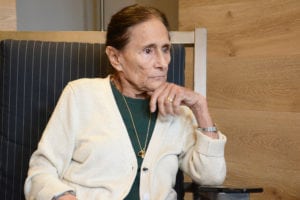
Yael Dayan, who made her third trip to Louisville the week of September 15, says Diaspora Jews must fighter harder in their dealings with the Israeli government to secure the equality and religious pluralism they desire. (photo by William Beasley)
Yael Dayan believes in an Israel where all Jews are created equal, but she doesn’t believe American Jews have done enough to make that happen.
“Israelis, like myself, we think you’re not fighting hard enough,” the 78-year-old secular writer and politician, and the daughter of the late Israeli army General Moshe Dayan told Community in an exclusive interview.
Dayan was referring, in part, to two June decisions by Prime Minister Benjamin Netanyahu’s Cabinet to put a hold on the 2016 deal to create an egalitarian section of the Western Wall (also known as the Kotel) and to advance a bill in the Knesset to give the ultra-Orthodox Chief Rabbinate complete control of conversions performed in the country.
Facing pushback in the Diaspora and at home, Netanyahu later agreed to delay the bill. Then in August, the Israeli Supreme Court said the government must either reinstate the Western Wall agreement or explain why it was on hold.
Nevertheless, Dayan is troubled by the growing influence Orthodox Jewish groups – political parties, the Chief Rabbinate – have over daily life in her country.
“If Israel wants to be a Jewish democracy, the land of the Jewish people,” she said, “it should be very clear that it’s a land of all the Jewish people.”
Dayan was in Louisville Friday, September 15, to speak at The Temple and to promote her new autobiography, Transitions, a “summation” of her life, career and the tumultuous events she has seen.
Since ultra-Orthodox parties in Netanyahu’s government oppose pluralistic worship at the Kotel and insist upon religious control in the country, Dayan warned Diaspora Jews that the prime minister will always sacrifice their interests in order to cling to power.
“You’re the easiest sacrifice,” she said.
Dayan’s frankness shouldn’t be surprising. She has been an outspoken woman and a relentless human rights advocate throughout her life.
Born in 1939 in British mandate Palestine, Dayan said her life’s story “parallels” Israel’s, the country she literally grew up with.
“We [Israelis] have gone through some magnificent times and some sad and tragic times,” she said.
However, she lamented, Israel is not living up to its promise.
“Today, there is a disappointment or sort of regret [in Israel], a feeling that we are not really where we would like to be,” Dayan said.
“The basic Zionist democratic Jewish, ideological – not in the political sense – [state] is in regression.”
For Dayan, that means the religious community, whose rights must be respected, must not be allowed to impose their rules on the rest of the country.
“I want buses to run in Tel Aviv on Saturday; that’s my fight,” Dayan said. “Because poor people can’t take their kids to the beach, unless they have a private car, because there are no buses. This is what I mean by separation.”
It also means that marriages and conversions performed by Reform and Masorti (Conservative) must be recognized.
She understands that American Jews are reluctant to get involved in Israeli affairs, even on issues that concern them, because they don’t live there and don’t share in its struggles.
But Dayan has a good response to that argument: There’s a difference between criticism and fighting.
“This is beyond criticism it’s a fight; it’s a battle and you have to win this battle, and we’re there for you to understand it, and to fight on principle. This government thinks they have you in their pocket whatever they decide.”
While Dayan made clear she doesn’t advocate boycotts of Israel as a weapon, she was less clear on how Diaspora Jews should fight for their causes and what tactics they should use.
“I think the Israeli government should understand that you’re not at their beck and call,” she said.
Dayan’s autobiography is far from an upbeat book, reviewers have said. Famed Israeli novelist Amos Oz wrote that many of chapters are “sad and heartbreaking,” though he admired how she wrote with a lack of “bitterness and resentment.”
Dayan recounted how her publisher warned her that readers don’t want to read stories about illness and death. (Much of the book deals with the lengthy illness of her late husband, Dov Sion.)
“Too bad,” she said. “It’s not anymore a mystic world that only the shamans and the sages know about. All we need to do is open our computers and we’re into the world of illness and death and disasters.”
A sabra whose family has lived in the holy land for three generations, Dayan served as a captain in the Israel Defense Forces before studying international relations ans biology at Hebrew University of Jerusalem.
She began her literary caree as a columnist for Yedioth Ahronoth, Ma’ariv, Al HaMishmar and Davar. She went on to publish five novels and a memoir of the Six-Day War.
Dayan spent her 10 years as a Knesset member championing the rights of women, including a law that recognizes sexual harassment as a crime.
Yet she described Israeli politics as a male-dominated realm, despite high-profiled convictions of former President Moshe Katsav for rape and Prime Minister Ehud Olmert for taking bribes and obstruction of justice.
She has also fought for LGBT and other human rights and against domestic violence in Israeli society, and she has been a vocal proponent for the Peace Now movement.
Almost 80 now, the once attractive woman now walks with the cane and sometimes uses a wheelchair to get around. She uses a portable oxygen pack when walking, though she removed the hoses from her nostrils during the interview to demonstrate she would not “collapse and choke” without it.
Clearly, the forceful spirit that has defined Dayan is still alive and well.


